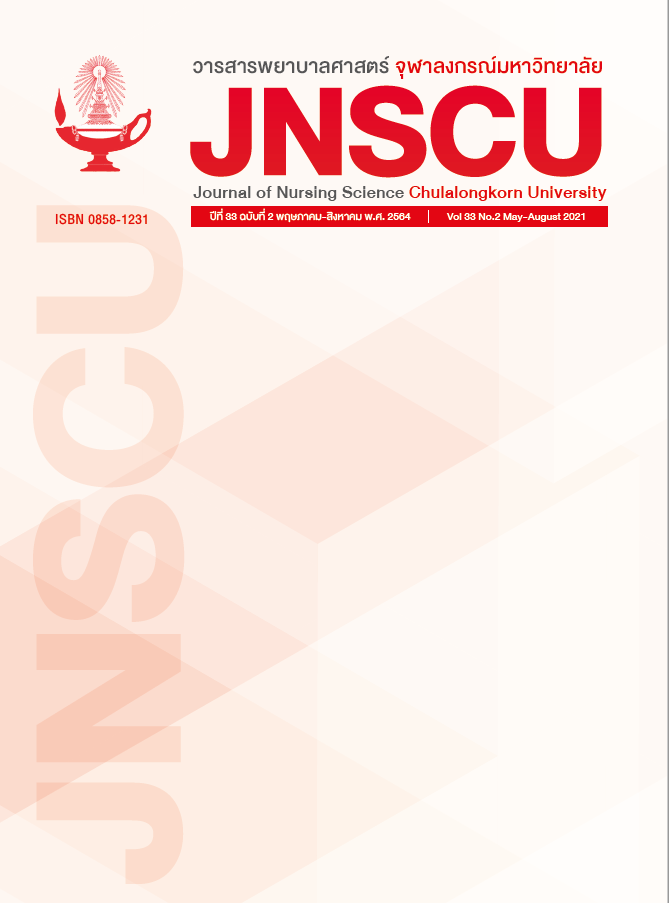ผลของโปรแกรมการให้คำปรึกษาพฤติกรรมครอบครัวต่อ พฤติกรรมการดื่มแอลกอฮอล์ของผู้ติดแอลกอฮอล์
คำสำคัญ:
การให้คำปรึกษาพฤติกรรมครอบครัว, พฤติกรรมการดื่มแอลกอฮอล์, ผู้ติดแอลกอฮอล์บทคัดย่อ
วัตถุประสงค์: 1) เพื่อเปรียบเทียบพฤติกรรมการดื่มแอลกอฮอล์ของผู้ติดแอลกอฮอล์ระหว่างก่อนและหลังได้รับโปรแกรมการให้คำปรึกษาพฤติกรรมครอบครัว และ 2) เพื่อเปรียบเทียบพฤติกรรมการดื่มแอลกอฮอล์ของผู้ติดแอลกอฮอล์กลุ่มที่ได้รับโปรแกรมการให้คำปรึกษาพฤติกรรมครอบครัวกับกลุ่มที่ได้รับการพยาบาลตามปกติ
รูปแบบการวิจัย: การวิจัยกึ่งทดลอง
วิธีดำเนินการวิจัย: กลุ่มตัวอย่าง คือ ผู้ติดแอลกอฮอล์และสมาชิกในครอบครัวที่อยู่ระหว่างรักษาแบบผู้ป่วยใน โรงพยาบาลจิตเวชนครราชสีมาราชนครินทร์ จำนวน 50 ครอบครัว เครื่องมือที่ใช้ คือ 1) โปรแกรมการให้คำปรึกษาพฤติกรรมครอบครัว 2) แบบสอบถามข้อมูลส่วนบุคคล 3) แบบบันทึกพฤติกรรมการดื่มแอลกอฮอล์ 4) แบบประเมินสัมพันธภาพในครอบครัว และ 5) แบบประเมินปัญหาการดื่มแอลกอฮอล์ เครื่องมือทุกชุดผ่านการตรวจสอบความตรงตามเนื้อหา แบบบันทึกพฤติกรรมการดื่มแอลกอฮอล์ตรวจสอบความเที่ยงโดยวิธีทดสอบซ้ำพบค่าสัมประสิทธิ์สหสัมพันธ์ของเพียร์สันเท่ากับ .94 แบบประเมินสัมพันธภาพในครอบครัว และแบบประเมินปัญหาการดื่มแอลกอฮอล์ตรวจสอบค่าความเที่ยงพบค่าสัมประสิทธิ์อัลฟาของครอนบาคเท่ากับ .90 และ .90 ตามลำดับ วิเคราะห์ข้อมูลโดยใช้สถิติที
ผลการวิจัย: 1) พฤติกรรมการดื่มแอลกอฮอล์ของผู้ติดแอลกอฮอล์ก่อนและหลังได้รับโปรแกรมการให้คำปรึกษาพฤติกรรมครอบครัวแตกต่างกันอย่างมีนัยสำคัญทางสถิติที่ระดับ .05 และ 2) พฤติกรรมการดื่มแอลกอฮอล์ของผู้ติดแอลกอฮอล์ที่ได้รับโปรแกรมการให้คำปรึกษาพฤติกรรมครอบครัวและผู้ติดแอลกอฮอล์ที่ได้รับการพยาบาลตามปกติแตกต่างกันอย่างมีนัยสำคัญทางสถิติที่ระดับ .05
สรุป: โปรแกรมการให้คำปรึกษาพฤติกรรมครอบครัวสามารถทำให้พฤติกรรมการดื่มแอลกอฮอล์ของผู้ติดแอลกอฮอล์ลดลงได้ ซึ่งเป็นไปตามสมมติฐานที่ตั้งไว้
เอกสารอ้างอิง
National statistical office. The survey of
smoking behaviour and alcohol
consumption among Thai population
in 2017 [Internet]. 2018 [cited 2019
Feb 5]. Available from: http://www.nso.
go.th/sites/2014/Pages/News/2561/
N30-08-61-2.aspx
International health policy program. Disabilityadjusted
life year: DALY 2014. Nonthaburi:
The Graphico System; 2016.
Iwanicka KA, Olajossy M. The concept of
alcohol craving. Psychiatr Pol 2015;
(2): 295-304.
Ratanajuntar W, Uthis P. Selected factors
related to cognitive impairment in
persons with alcohol dependence
[Master’s thesis in Nursing Program].
Bangkok: Chulalongkorn University;
Hakulinen C, Elovainio M, Batty GD, Virtanen
M, Kivimäki M, Jokela M. Personality and
alcohol consumption: Pooled analysis
of 72,949 adults from eight cohort
studies. Drug Alcohol Depend 2015; 151:
-4.
Rotunda RJ, Scherer DG, Imm PS. Family
systems and alcohol misuse: Research
on the effects of alcoholism on family
functioning and effective family
interventions. Prof Psychol Res Pr 1995;
(1): 95-104.
Rowe CL. Family therapy for drug abuse:
Review and updates 2003–2010.
J Marital Fam Ther 2012; 38(1): 59-81.
Totharong P, Limprasutr P, Wannapornsiri C.
Experience of persistent cut down of
alcohol intake among former alcohol
dependence. Journal of Nursing Science
Naresuan University. 2008; 2(2): 45-61.
(in Thai)
Techaattakun A, Uthis P. The effect of family
intervention for dual disorders program
on alcohol consumption among alcohol
dependence clients with psychiatric
comorbidity. JRTAN 2017; 18(Suppl):
-31. (in Thai)
Pongam T, Uthis P. The effect of brief
couple relationship therapy program on
alcohol consumptions among alcohol
dependence. JRTAN 2018; 19(Suppl):
-8. (in Thai)
O’Farrell TJ, Murphy M, Alter J, Fals-Stewart
W. Behavioral family counseling for
substance abuse: A treatment development
pilot study. Addict Behav 2010;
(1): 1-6.
Srikosai S. Effectiveness of motivational
enhancement therapy among alcohol
dependence clients receiving service
at Suang Prugn psychiatirc hospital
[Master’s thesis in Nursing Program].
Chiang Mai: Chiang Mai University; 2005.
Thaothong S, Lueboonthawatchai O. The
effect of family counseling program on
quality of life of schizophrenic patients
in community [Master’s thesis in Nursing
Program]. Bangkok: Chulalongkorn
University; 2005.
Sinlapakit P, Kittirattanapaiboon P. Guidelines
for the problem of drinking alcohol for
primary care unit. Bangkok: Tantawan
Paper; 2010.
Sukchit P, Boonda P, Saneemongkorntharatorn
K, Namkorn S. The effects of group
counseling on reducing alcohol
consumption in persons with alcohol
dependence. JTNMC 2018; 5(1): 32-44.
(in Thai)
Joolakson S, Sakda P, Joowong S, Krausanit
S, Wichaidit K. Effects of family
psychoeducation program on family
function as perceived by patients with
alcohol or substance induced psychotic.
JPNMH 2017; 31(3): 71-83. (in Thai)
Salee A, Virasiri S. Family adaptation among
alcohol dependent: Multi-cases study.
Journal of Nursing and Health Care
; 38(2): 188-94. (in Thai)
ดาวน์โหลด
เผยแพร่แล้ว
ฉบับ
ประเภทบทความ
สัญญาอนุญาต

อนุญาตภายใต้เงื่อนไข Creative Commons Attribution-NonCommercial-NoDerivatives 4.0 International License.
##default.contextSettings.thaijo.licenseTerms##


